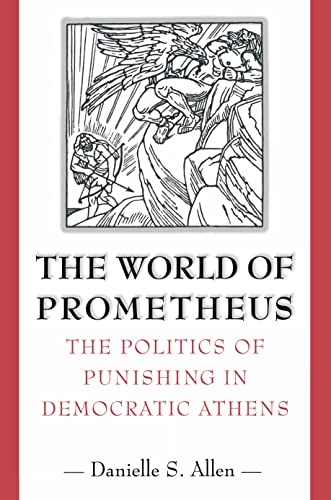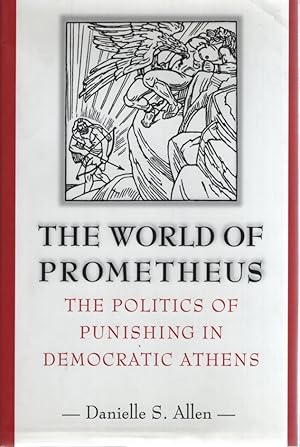0691058695 - The World of Prometheus: The Politics of Punishing in Democratic Athens von Allen, Danielle S. (2 Ergebnisse)
Produktart
- Alle Product Types
- Bücher (2)
- Magazine & Zeitschriften
- Comics
- Noten
- Kunst, Grafik & Poster
- Fotografien
- Karten
- Manuskripte & Papierantiquitäten
Zustand
- Alle
- Neu
- Antiquarisch (2)
Einband
- alle Einbände
- Hardcover (2)
- Softcover
Weitere Eigenschaften
- Erstausgabe
- Signiert
- Schutzumschlag (1)
- Angebotsfoto (1)
Gratisversand
- Versand nach USA gratis
Land des Verkäufers
Verkäuferbewertung
-
The World of Prometheus: The Politics of Punishing in Democratic Athens
Verlag: Princeton University Press, 2000
ISBN 10: 0691058695ISBN 13: 9780691058696
Anbieter: Anybook.com, Lincoln, Vereinigtes Königreich
Buch
Zustand: Fair. This is an ex-library book and may have the usual library/used-book markings inside.This book has hardback covers. Book contains pencil markings. In fair condition, suitable as a study copy. No dust jacket. Please note the Image in this listing is a stock photo and may not match the covers of the actual item,900grams, ISBN:0691058695.
-
The World of Prometheus: The Politics of Punishing in Democratic Athens.
Verlag: Princeton University Press, 2000
ISBN 10: 0691058695ISBN 13: 9780691058696
Anbieter: Fundus-Online GbR Borkert Schwarz Zerfaß, Berlin, Deutschland
Buch
Cloth with dustjacket. Zustand: Gut. XIII, 449 p. Aus der Bibliothek von Prof. Wolfgang Haase, langjährigem Herausgeber der ANRW und des International Journal of the Classical Tradition (IJCT) / From the library of Prof. Wolfgang Haase, long-time editor of ANRW and the International Journal of the Classical Tradition (IJCT). - Schutzumschlag berieben und leicht angeschmutzt, Randläsuren und ein kleiner Einriss am Schutzumschlag, Buchschnitt angeschmutzt, innen sauber / dust jacket rubbed and lightly soiled, marginal tears and one small tear to dust jacket, book edges soiled, book inside clean. - For Danielle Allen, punishment is more a window onto democratic Athens' fundamental values than simply a set of official practices. From imprisonment to stoning to refusal of hurial, instances of punishment in ancient Athens fueled conversations among ordinary citizens and political and literary figures about the nature of justice. Recreating in vivid detail the cultural context of this conversation, Allen shows that punishment gave the community an opportunity to establish a shining myth of harmony and cleanliness: that the city could be purified of anger and social struggle, and perfect order achieved. Each member of the city including notably women and slaves had a specific role to play in restoring equilibrium among punisher, punished, and society. The common view is that democratic legal processes moved away from the "emotional and personal" to the "rational and civic," but Allen shows that anger, honor, reciprocity, spectacle, and social memory constantly prevailed in Athenian law and politics. Allen draws upon oratory, tragedy, and philosophy to present the lively intellectual climate in which punishment was incurred, dehated, and inflicted hy Athenians. Broad in scope, this hooh is one of the first to offer both a full account of punishment in antiquity and an examination of the political stahes of democratic punishment. It will engage classicists, political theorists, legal historians, and anyone wishing to learn more ahout the relations between institutions and culture, normative ideas and daily events, punishment and democracy. / CONTENTS PREFACE INTRODUCTION PART ONE : THE PRELIMINARIES CHAPTER ONE What Is Punishment? Introduction "Revenge" versus "Punishment": Rereading the Oresteia Studying Punishment as Authority: Reading the Prometheus Bound Precis CHAPTER TWO Institutional Context Introduction Penal Institutions and Democratic Power The Lay Prosecutor and the Parameters of Judgment CHAPTER THREE Cultural Context Anger/Orge The Agon and Honor Reciprocity Social Memory, Social Knowledge Language Conclusion CHAPTER FOUR Punishment and Its Tragic Problems The Mythic Imaginary Method Disease and Remedy Power, Tyranny, and Law Conclusion PART TWO : THE PROCESS OF PUNISHING CHAPTER FIVE Initiation, Part One Knowledge, Power, Action Investigation Initiation: Metics, Proxenoi, and Xenoi Initiation: Slaves Initiation: Women CHAPTER SIX Initiation, Part Two The Male Citizen Prosecutor Back to the Bees and Wasps Again The Household: Women and Men Together City as Collective CHAPTER SEVEN The Negotiation of Desert, Part One The Magic of Speech Pity and Anger The First Norm of Public Agency: Deserving to Punish and Dispelling Charges of Sycophancy CHAPTER EIGHT The Negotiation of Desert, Part Two Introduction The Second Norm of Public Agency: Using Social Memory and Law The Rule of Judgment versus the Rule of Law The Rule of Law in Plato and Aristotle The Third Norm of Public Agency: Shaping the Democratic Community CHAPTER NINE Execution War, Peace, and the Formalism of Punishment The Details: Punishments and Their Executors Two Forms of Memory: Remembering and Forgetting The Symbolism of Remembering and Forgetting War and Peace, the Body and Silence Punishments of Reintegration Punishments that Redefine the "Whole" Community The Amnesty PART THR EE: INTERVENTIONS IN THE CONVERSATION CHAPTER TEN Plato's Paradigm Shifts The Symbol of Leontios Reform over Reciprocity The Erasure of Orge Undoing the Athenian "Principle of the Public": The Republic CONTENTS The Just City and the Power of the Symbol The Incurables and the Necessity for Anger/Orge in the Just City of the Laws CHAPTER ELEVEN Aristotle's Compromises On Justice and Desert EPILOGUE: The Reform of Prometheus and Promethean Rebellion APPENDIXES A. The Number of Magistrates in Athens B. The Nature and Scope of Arbitration in Athens C. The Relative Frequency of Penal Words within Each Orator D. Further Argument about the Decree of Cannonus E. Catalog of Cases of Punishing (or Attempts at Punishing) in Tragedy ENDNOTES BIBLIOGRAPHY INDEX. ISBN 9780691058696 Sprache: Englisch Gewicht in Gramm: 788.



